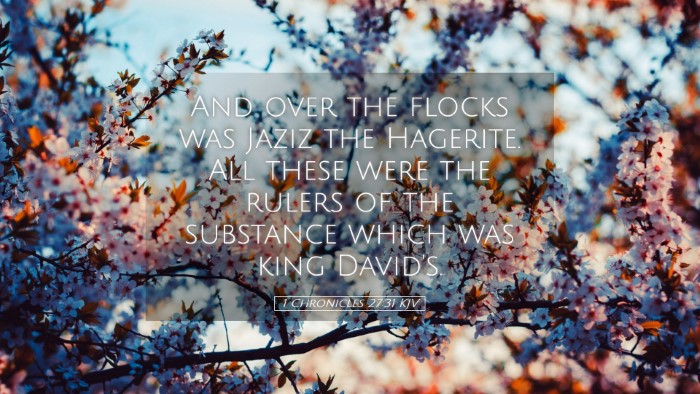Commentary on 1 Chronicles 27:31
Bible Verse: 1 Chronicles 27:31 - "And over the flocks was Jerijah the Hethite: all that was of the sheep for the offerings for the service of the house of God."
Context and Significance
The passage in 1 Chronicles 27:31 forms part of a broader section that details the organization of King David's administration and military in Israel. In this specific verse, we see a mention of Jerijah, who oversees the flocks designated for offering in the temple worship. The chronicler emphasizes the importance of these roles, as they point to the holistic structure of worship and governance established by David. It is vital to understand how the king arranged his administration in the context of communal worship and the service of God.
Overview of Commentaries
This commentary draws insights from notable public domain sources including those by Matthew Henry, Albert Barnes, and Adam Clarke. Their perspectives offer a multi-faceted understanding of the verse, enriching the theological and practical implications for contemporary readers.
Matthew Henry's Perspective
1. Roles in Worship: Matthew Henry emphasizes the significance of the organization stated in the Chronicles. He notes that Jerijah’s role in overseeing the flocks highlights the necessity of dedicated individuals managing aspects of worship, which includes the livestock used for sacrifices. Henry points out that God’s service requires order and diligent oversight.
2. Reflection on Offerings: Henry elaborates that the mention of "the sheep for the offerings" signifies the care that must be extended even to the animals used in sacrifices. The health and quality of the offerings symbolize the spiritual state of the offerings being brought forward to God. Thus, the spiritual integrity of worship is mirrored in the physical offerings presented.
Insights from Albert Barnes
1. Historical Context: Albert Barnes provides a historical context to the reign of David, illustrating how he built a kingdom that was not only militarily strong but also spiritually robust. He asserts that the meticulous appointment of officials, like Jerijah, demonstrates David’s understanding of the need for a system that supports reverence and duty towards God.
2. Symbolism of the Flocks: Barnes indicates the importance of flocks in ancient Israelite society, where they are not merely economic resources but also bear deep spiritual significance. He highlights that the well-being of these flocks reflects the community’s relationship with God; healthy flocks lead to acceptable offerings.
Adam Clarke's Analysis
1. Specific Responsibilities: Adam Clarke dives into the particular responsibilities assigned to Jerijah, interpreting that in ancient Israel, the leading of flocks involved both practical and spiritual dimensions. Clarke points to the necessity of appointing godly men to such roles, affirming that the character of those managing the congregational offerings is critical.
2. Theological Implications: Clarke speaks to the underlying theological implications of the role. He argues that Jerijah’s role as the overseer of offerings hints at God's desires for quality in rituals and service. This insistence on quality reveals a broader understanding of the nature of worship as being tied intimately to the integrity of offerings; ultimately, it points towards the New Testament understanding of Jesus as the perfect sacrifice.
Practical Applications for Pastors and Students
The insights gathered from these commentaries reveal several practical applications:
- Order in Ministry: Just as David organized his administration, so too should modern ministry strive for order, ensuring each aspect of worship is carried out with diligence and attention to detail.
- Integrity of Offerings: The quality of one’s gifts to God should reflect personal faith and commitment, serving as a reminder that God deserves our best in all things.
- Appointing Faithful Servants: It is crucial to appoint individuals who not only have skills but also a heart aligned with God’s purposes in any church or ministry role.
- Fostering Spiritual Worship: The holistic approach to worship includes not just spiritual acts but also the stewardship of all that God has entrusted to the believers, including their resources and relationships.
Conclusion
The verse in 1 Chronicles 27:31 speaks volumes about the structure and intention behind service in the house of God. Through the insights of Henry, Barnes, and Clarke, we are reminded of the sacredness of our offerings and roles in ministry—encouraging a reverent and ordered approach towards worship that honors God’s name. As we further explore this text, may we be challenged to evaluate our own service and the integrity of our offerings to our Lord.


